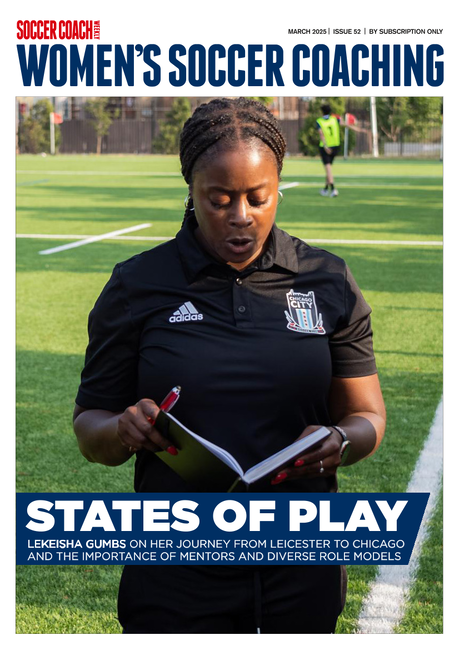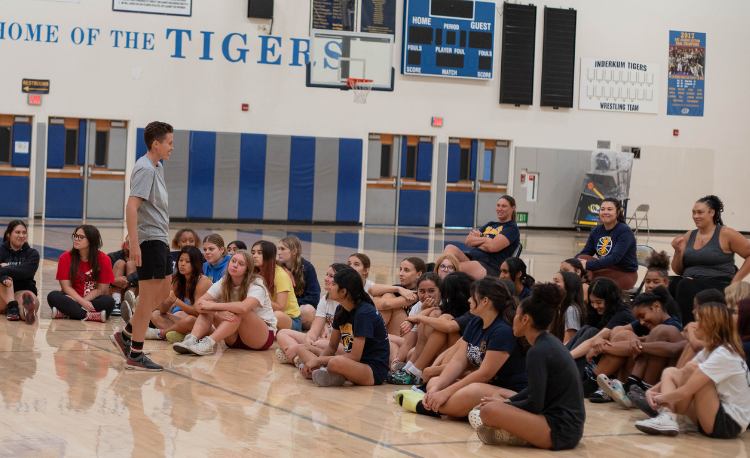You are viewing
1 of your 3 free articles
How to best support wellbeing of players
Happiness is the atmosphere in which all things, including soccer teams, thrive. By Jenny Coe, the FA’s performance wellbeing lead for the women’s pro game.
In sports, whether you are coaching at grassroots level or guiding a professional team, the connection between happiness and performance is crucial.
While physical fitness, tactics and skills are obviously essential, a player’s wellbeing is equally important.
Research, including work by psychologists like Barbara Fredrickson, suggests that a player’s happiness can significantly impact their performance.
Your influence, as a coach, can help nurture this happiness and keep you attuned when something might be off.
Happiness in sports isn’t just about the thrill of winning; it’s about a deeper sense of wellbeing, including positive emotions, life satisfaction and a sense of purpose.
Players who are happier often seem to have more resilience across different contexts, are more focused, and are capable of achieving peak performance on a more consistent basis.
However, this relationship can be complex and varies from person to person.
Happiness can be understood through hedonic and eudaemonic wellbeing.
Hedonic wellbeing involves the pursuit of pleasure and the avoidance of discomfort. In a sporting context, this might look like the exhilaration of scoring a goal, executing a perfect play, or the satisfaction of a hard-earned victory.
Eudaemonic wellbeing is about finding meaning and fulfilment in what you do. It is the deeper sense of purpose that drives a player to push through tough training, work tirelessly for the team and find satisfaction in their role, even if it doesn’t always lead to personal glory.
Both forms of happiness are important in sports. While hedonic happiness might provide immediate energy, eudaemonic happiness sustains players through the more demanding aspects of their sport, keeping them committed over the long term.
Encouraging player growth and connection
Whether you are coaching youth teams, amateurs or professionals, here are some approaches to support player wellbeing:
Build a positive team culture
Sports are about more than just physical skill; they are also about character and camaraderie.
Encouraging a culture where every player feels valued doesn’t require grand gestures. Simple actions like acknowledging effort and promoting inclusivity can significantly boost morale and team spirit.
Embed mental health in conversations
Normalising discussions about mental health or wellbeing within your team can help players feel more comfortable opening up.
Asking open-ended questions like “How are you handling everything off the field?” shows you care about them as individuals, not just players.
Individualise your approach
Every player is different, with unique motivations and ways of finding joy in their sport.
Regular check-ins, or check-outs at the end of your sessions, help you tailor your support to meet each player’s needs.
Promote a balanced life
Sports can be demanding, both physically and mentally.
Encouraging players to pursue interests outside of their sport – whether that’s spending time with family, exploring hobbies, or resting – can prevent burnout and keep them refreshed and motivated.
This can also be a great tip for coaches who are finding it hard to switch off themselves.

Recognising and addressing wellbeing issues: the art of noticing
As a coach, it’s important to recognise when a player’s happiness might be waning and respond thoughtfully...
Behavioural shifts: Be aware of changes in behaviour, such as withdrawal or frustration, which might signal something isn’t quite right.
Performance declines: A dip in performance might indicate a player is struggling mentally or emotionally. Opening a conversation about how they are feeling can help address underlying issues.
Foster open dialogue: Creating a safe space for players to discuss their challenges without fear of judgment can be crucial. Encouraging open discussions might help bring out issues that would otherwise go unspoken.
How to respond with care
When a player is struggling, how you respond can make a big difference...
Listen actively: If a player approaches you with a concern, taking the time to really listen can be powerful. Sometimes, just knowing they’ve been heard can make a significant difference. They don’t always need a solution.
Provide practical support: Offering solutions that align with the player’s needs, such as adjusting their training schedule or offering stress management strategies, can be helpful. It’s important to also know what your boundaries are on this, and have a signpost person or plan in mind.
Keep the connection going: Regularly checking in with the player after addressing an issue reinforces that their wellbeing is a priority, helping build trust and a sense of security within the team.
Happiness isn’t just an added bonus in sport – it’s a cornerstone of athletic success.
While the relationship between happiness and performance is supported by research, it is also nuanced, and varies depending on the individual and context.
As a coach, you have the chance to foster both hedonic and eudaemonic wellbeing, help players grow as individuals, and address the unique needs of each player. By doing so, you will help players achieve their best, while also enjoying a richer, more balanced life.
Happiness is the atmosphere in which all things thrive.
Related Files
Newsletter Sign Up
Newsletter Sign Up
Discover the simple way to become a more effective, more successful soccer coach
In a recent survey 89% of subscribers said Women's Soccer Coaching makes them more confident, 91% said Women's Soccer Coaching makes them a more effective coach and 93% said Women's Soccer Coaching makes them more inspired.
*includes 3 coaching manuals
Get Inspired
All the latest techniques and approaches
Women's Soccer Coaching offers proven and easy to use soccer drills, coaching sessions, practice plans, small-sided games, warm-ups, training tips and advice.
We've been at the cutting edge of soccer coaching since we launched Soccer Coach Weekly in 2007, creating resources for the grassroots youth coach, following best practice from around the world and insights from the professional game.







